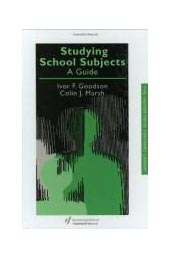Studying School Subjects: a guide
Conclusions, Complexities and Conjectures
Secondly the study was specific to a particular period of time in the evolution of three school subjects. The concern was with subjects during the period when academic establishment was the primary pursuit. For geography and biology we have not investigated whether the patterns were modified after broad-based acceptance and for rural and environmental studies this remains a hypothetical issue. Certainly there seem grounds for believing that the periods when subjects pursue and achieve academic establishment (with the associated status and resources) may be times of particular concern with, and acceptance of, unity within the subject. Nonetheless comparison between the subjects studied illuminates a number of important and suggestive differences. The description of the evolution of geography, for instance, shows that here was a subject with a profound and continuing identity problem. In such a situation a firm alliance was moulded between academic geographers and the school teachers who were organised in the Geographical Association. The case of biology, however, shows that other subjects do not necessarily share to the same degree either the geographers' paranoia nor their strong sense of alliance in the face of new contenders for academic status. It is therefore possible that subjects with higher academic self-confidence would not act in the starkly territorial manner discerned in this book.
In considering other subjects, classics would seem to offer an interesting study of an 'academic' subject representing powerful interest groups which has nonetheless declined. Perhaps this indicates a paradox: that although subjects must grow out of their utilitarian origins to become 'academic' they need to continue to be generally accepted as 'vocational' qualifications in order to survive. Likewise once accepted as 'academic' subjects, they must continue to appeal at a pedagogic level to learners. Hence in the era following academic acceptance such issues sometimes receive considerable attention as was the case with the Nuffield projects in science subjects.
Some subjects have successfully followed the route to academic acceptance so hopefully pursued by environmental studies advocates but still encountered barriers to total entry into the secondary school curriculum. For instance politics, economics and psychology have developed as disciplines in universities and been broadly accepted at 'A' level yet are still rarely found in the general curriculum of secondary schools. This could again illustrate the negative territorial power of school subject groups.
